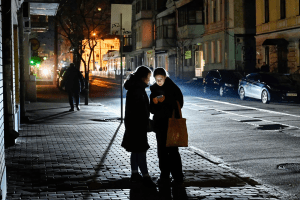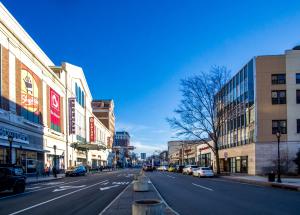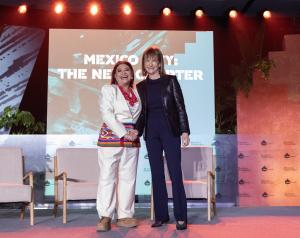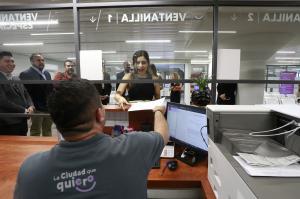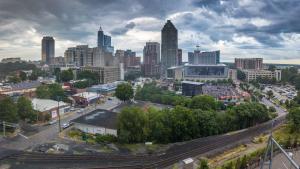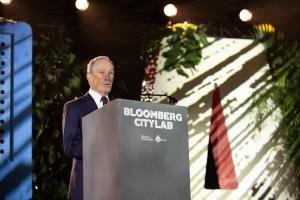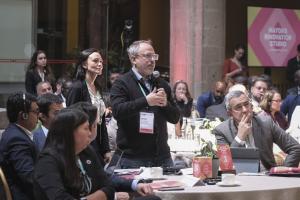 Read More
Read More
The state of cities and the future of the field: advancing mayoral ambition and public innovation in 2024
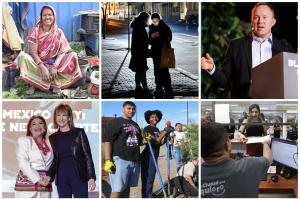
Photos by Getty, City of Mesa, and courtesy of Bloomberg Philanthropies
Listen to This Article
At Bloomberg Philanthropies, we are committed to ensuring better, longer lives for the greatest number of people. With more than half the world’s population living in cities, local governments are central to making that happen. That’s why our Government Innovation team is laser-focused on helping city halls build the skills and capacity they need to consistently develop and implement increasingly ambitious solutions that deliver tangible results for residents.
And this work has never had greater scope or urgency. From supporting digital service development in wartime Kyiv to helping U.S. localities secure transformational infrastructure funding to connecting mayors worldwide with young people to lead the fight against climate change, we’re constantly seeing fresh evidence of the impact of government innovation.
Here are some of our greatest priorities and achievements from 2024—and how they lay the groundwork as we look ahead in 2025.
Adding innovation to cities’ wartime arsenal.
While every local government deals with crises, some of today’s city leaders are balancing the continuity of basic service delivery with protecting residents from bombs and addressing trauma in the heat of war. In doing so, they’re also demonstrating how digital capacity enables agility in crisis.
For example, after the Russian invasion of Ukraine, Kyiv quickly repurposed a parking and public-transport app to begin alerting residents of incoming attacks and directing them to the closest air-raid shelters. Bloomberg Philanthropies partnered with the city in early 2024 to accelerate public service digitization, including by creating a citywide system to provide mental-health support to residents.
As Bloomberg Philanthropies founder and former mayor of New York City Michael R. Bloomberg explained in an op-ed he co-authored with Kyiv Mayor Vitali Klitschko, “While global attention and international aid flows to national governments, it is no less important to equip mayors to lead their cities through crisis—and Kyiv helps illustrate the stakes… One of the best ways to support a nation is to equip a mayor.” Following the initial success of this effort, we’re now extending support to five other Ukrainian cities that have been at the forefront of the Russian invasion: Lviv, Vinnytsia, Chernvtsi, Ivano-Frankivsk, and Bucha.
Our efforts in conflict-impacted areas include hard-hit municipalities in Israel, as well. There, the Bloomberg Regional Resilience Initiative is up and running—and beginning to provide localities with the support they need.
Learn more in Wired: Kyiv is using homegrown tech to treat the trauma of war
Bringing more than $3 billion in federal funds home to municipalities.
Over the past four years, a trio of landmark federal laws unleashed an unprecedented $1.2 trillion to empower towns and cities to tackle some of the nation’s toughest challenges. From rebuilding crumbling roads and bridges to expanding high-speed internet access, addressing the climate crisis, and uplifting underserved communities, this wave of investment marked a dramatic shift from decades of underfunding local governments. For leaders on the ground, it was both an historic opportunity and a formidable challenge.
What set this funding apart was its direct-to-municipality approach, putting cities in the driver’s seat to reshape their futures. But there was a catch: many local governments—especially smaller towns and mid-sized cities—had little to no experience applying for federal grants, let alone managing such transformative funding. Without swift intervention, these communities risked being left out of the moment.
That’s where Bloomberg Philanthropies stepped in. Listening closely to the concerns of local leaders, we launched a bold national initiative: the Local Infrastructure Hub. Rallying an impressive coalition of organizations and experts, we made it our mission to ensure communities had the tools and knowledge to compete for this once-in-a-generation funding. By the end of 2024, the Hub had worked with roughly 1,600 communities, primarily small and mid-sized, helping them navigate the complex grant process. The results? Over $3 billion in federal funds secured, fueling projects that are transforming lives and reshaping futures across the country.
Learn more in TIME: Why America’s infrastructure is so hard to fix
Showcasing a new regional lighthouse for government innovation.
Latin American municipalities such as Mexico City—which pioneered inclusive digital services available to residents up and down the income spectrum—have emerged as global capitals for public-sector innovation. So it was only natural that we hosted our preeminent global cities summit Bloomberg CityLab in that city, whose former Mayor Claudia Sheinbaum was recently elected to the presidency, giving a sense of just how much is possible when a local leader transforms peoples’ lives. In partnership with the Aspen Institute, we brought over 700 mayors, senior city officials, urban thinkers, entrepreneurs, and creatives to get a look up-close at the machinery of government in her city—and a feel for what it’s like when local government innovation begins to go national.
Learn more in Bloomberg CityLab: Sheinbaum made Mexico City the digital capital of the Western Hemisphere
Making urban solutions go viral.
Cities face similar challenges, which should make the spread of great ideas easy. Yet, vital urban innovations often take far too long to go mainstream. We studied cases where city solutions broke through globally—and why others fell short.
What we found: cities need help identifying promising ideas that fit their needs, adapting those ideas to local contexts, making a compelling case to funders and stakeholders, and having the bandwidth to implement change.
That’s why we launched the Bloomberg Cities Idea Exchange—to build the knowledge infrastructure cities need to replicate innovations systematically. In 2024, the platform debuted with 11 proven solutions announced by Bloomberg Philanthropies CEO Patricia E. Harris in Mexico City. These solutions—including Istanbul’s model for fostering mutual aid among residents, Guadalajara’s Visor Urbano anti-corruption tool, and strategies for passing smart speed-limit legislation—are poised to reach thousands of cities and impact hundreds of millions of lives.
But this isn’t just about scaling ideas; it’s about empowering cities to make them stick. As our CEO explained, “We can help cities meet their biggest challenges by spreading proven solutions faster, but only if we also empower them to customize those solutions around their unique circumstances.”
Learn more in Vox: Cities face daunting challenges. Mike Bloomberg wants to help them help each other.
Positioning youth to save the planet—and see mayors as their partners in this work.
We know climate activism needs powerful new voices from the youngest people on the planet—the ones who have the greatest stake in the future. At the same time, it’s critical that local governments invite those who want to make a difference on climate into the effort in ways that are meaningful to them. That’s why we launched the Youth Climate Action Fund initiative in partnership with United Cities and Local Governments and the Bloomberg Center for Public Innovation, which have supported local leaders in activating some 1,100 youth-driven projects addressing environmental issues in nearly 100 cities, setting up thousands of young people as leaders against climate change. After all, it’s more critical than ever that cities move beyond traditional, top-down models and instead solicit ideas—and crowd in energy—from everyone in their communities.
Learn more in Grist: Bloomberg funds youth-led climate action in 100 cities worldwide
Embedding innovation capacity in over 80 cities worldwide that’s built to last.
From Baltimore to Bogotá, Reykjavik to Raleigh, and Los Angeles to Amsterdam, our Innovation Team (i-team) program is making an impact worldwide—delivering results for residents and building a foundation for long-term change.
In the U.S., our largest-ever corps of nearly 75 innovation experts is now embedding in city halls across the U.S. through the Bloomberg American Sustainable Cities initiative. Armed with expertise in data analysis, human-centered design, systems thinking, and project management, these i-teams aren’t just making incremental improvements—they’re helping cities transform for the future.
In Baltimore, we’ve increased the i-team’s size from four to 12 members and expanded statewide, launching the first-ever Bloomberg Philanthropies-supported state innovation team in partnership with Gov. Wes Moore.
Globally, the i-team program has reached 83 cities across nine countries and four continents, benefiting more than 65 million residents and inspiring thousands of public-sector organizations to adopt innovation practices. A key focus has been ensuring sustainability. In Bogotá, for instance, Bloomberg-supported i-team members are teaching courses at a local university and creating internal playbooks to embed innovation methodologies across every city agency. This ensures that the work continues long after grants end—laying the groundwork for enduring progress.
Learn more in Axios: Bloomberg to give $200 million for emissions cuts in 25 U.S. cities
Inspiring mayors on a whole new scale.
As a former mayor, our founder Mike Bloomberg knows as well as anyone that every day, cities care for the well-being of the world by delivering a host of critical services central to their residents’ lives. That’s why, last fall, he announced the largest-ever Mayors Challenge, our signature ideas competition that, for the first time, will deliver $1 million to 25 winning cities—with a special focus on essential municipal services.
In a time of waning trust in government, this new challenge calls on mayors to work with residents and entrepreneurs to radically reimagine everything from public transportation to waste management to housing and shelter to emergency response and more. Already, hundreds of cities have been inspired to rethink the very bedrock of what they deliver every day. From here, 50 finalists will receive $50,000 and participate in an Ideas Camp to hone and test their ideas, before winners are announced in October 2025. I can’t wait to see what they come up with.
Learn more in the Associated Press: Bloomberg Philanthropies launches its largest Mayors Challenge ever to inspire city leaders globally
Leading the field forward.
We believe the strength of any nation is generated by its cities. And a key part of what we do at Bloomberg Philanthropies is stay nimble so that our support for local governments always meets the moment.
In 2024, we heard from mayor after mayor that polarization was straining their ability to connect with the people they serve. So at a Mayors Innovation Studio in Mexico City, we supported over 100 mayors with fresh strategies for cutting through the noise of a misinformation-plagued media landscape to effectively communicate with their residents. And alongside partners at LSE Cities and Eurocities, we helped issue a report titled Public Innovation: Building Capacity in Europe’s City Governments.
With all of our efforts, the focus was on moving beyond basic best practices and approaches that defined government innovation when we began our work over a decade ago. After all, in an increasingly complex world, solutions must come faster, from more diverse places, and with greater sustainability. And while national and international politics can be polarizing, in our neighborhoods, on our streets, and through our city halls, we can continue to find common purpose.
Learn more at LSE Cities: Public Innovation: building capacity in Europe's city governments
James Anderson leads the Government Innovation program at Bloomberg Philanthropies.
